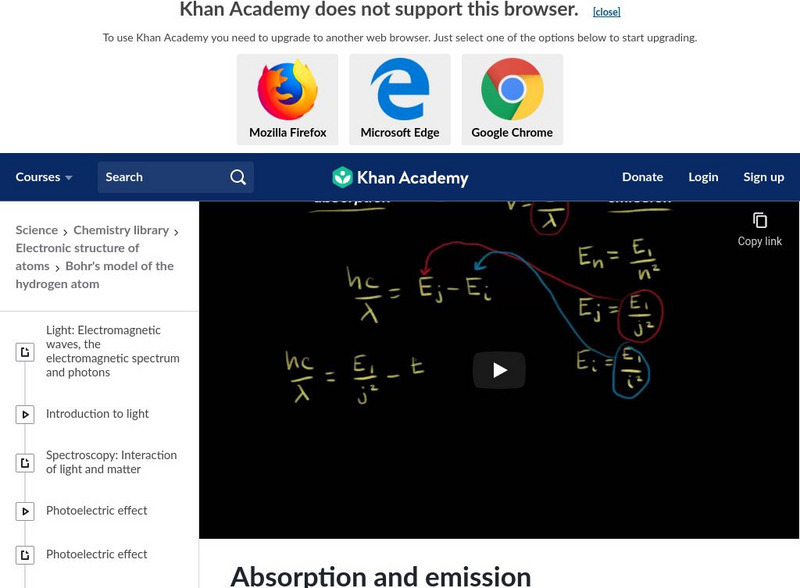SciShow
Blue Is Pretty Special: How Nature Gets the Blues
It's really difficult for life to create blue pigments, but the color can appear in a handful of compounds that create just the right conditions to reflect blue photons.
Curated Video
Line Spectra: The Fingerprints of Atoms
Line spectra are unique patterns of light emitted or absorbed by atoms, resembling discrete lines. These patterns serve as the "fingerprints" of different elements, providing critical insights into atomic structure and composition....
Curated Video
Bohr's Atomic Model: Electrons in Orbit
In 1913, Niels Bohr proposed an atomic model that dramatically altered our comprehension of atomic structure by establishing a novel framework for describing the arrangement and behaviour of electrons within an atom. The purpose of...
FuseSchool
PHYSICS - Radiation - Excited Electrons & Fluorescence
Emitting Radiation | Radioactivity | Physics | FuseSchool What do you think of when you hear the phrase “emitting radiation”? Do you think it’s a good thing or a bad thing? What if I told you it was vital for life on Earth? In this video...
msvgo
Bohr Model of the Hydrogen Atom
This nugget explains the features and mathematical expressions of Bohr's model and its advantages over Rutherford's model.
Professor Dave Explains
Periodic Table Part 1: Hydrogen
It's time to start our survey of the periodic table, and we are going to start with just one element, hydrogen. This is the most abundant element in the universe by a wide margin. What does it do? What are its properties? What are its...
Science360
Science Behind The News: Quantum Computing
Imagine if engineers could build a computer to be millions of times faster than anything that exists today, yet so small it's microscopic. John Preskill, a theoretical physicist at the California Institute of Technology, explains the...
Catalyst University
Kinetics: Quantum Yield & Jablonski Diagrams
Kinetics: Quantum Yield & Jablonski Diagrams
Catalyst University
Internal Conversion and Photoprotection: Applications in Biochemistry
Internal Conversion and Photoprotection: Applications in Biochemistry
Catalyst University
Quantum Harmonic Oscillator: Theory and Example Problem #1
Quantum Harmonic Oscillator: Theory and Example Problem #1
Catalyst University
Light-Harvesting Photosynthetic Pigments and Exciton Transfer
Light-Harvesting Photosynthetic Pigments and Exciton Transfer
Professor Dave Explains
Practice Problem: Electron Configuration and Quantum Numbers
Everyone has trouble with electron configurations and quantum numbers. Well today we are going to settle the score with a little practice!
Catalyst University
Resonance Fluorescence: A Special Case of Fluorescence
Resonance Fluorescence: A Special Case of Fluorescence
Catalyst University
Introduction to the Quantum Harmonic Oscillator: Wavefunction? Energy?
Introduction to the Quantum Harmonic Oscillator: Wavefunction? Energy?
Professor Dave Explains
The Quantum Harmonic Oscillator Part 3: Interpretation and Application
With the Schrödinger equation for the quantum harmonic oscillator solved, we are ready to analyze and interpret our results. What can we learn from the probability density function? How does the probability of finding a quantum particle...
msvgo
Radioactivity
This nugget explains the concept of radioactivity, its types and mathematical expressions and examples.
msvgo
Bonding in Coordination Compounds
It explains bonding, properties & limitations of Valence bond theory & crystal field theory of coordination compounds.
Higgsino Physics
The Physics of Superconductors
How a superconductor works. Everything from the physics and some of the history as well. Superconductors were discovered in 1911 by Heike Kamerlingh Onnes. It was discovered because it was made possible to liquefy helium which produced...
Catalyst University
How can fuel combust into a GIANT FIRE? | Hydrocarbon Combustion Mechanism
Obviously, gasoline and other fuels burn in the presence of fire. How does this occur? Here, we will explore the activation of oxygen to it excited singlet state and combustion of the hydrocarbon, octane. Join us here.
Catalyst University
Melanin Physiology: Melanin Absoprtion of UV Light and Internal Conversion to Heat
Melanin Physiology: Melanin Absoprtion of UV Light and Internal Conversion to Heat
Khan Academy
Khan Academy: Absorption and Emission
An explanation of the absorption and emission of energy using shell models. [10:30]

